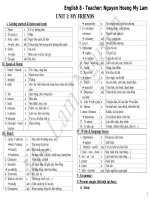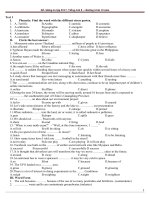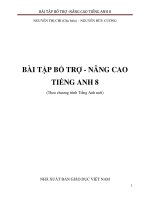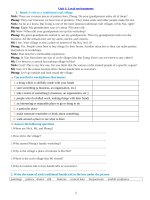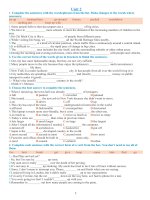Unit 1 Leisure Time Tiếng anh 8 chương trình mới
Bạn đang xem bản rút gọn của tài liệu. Xem và tải ngay bản đầy đủ của tài liệu tại đây (1.35 MB, 15 trang )
1
Trên con đường thành công không bao giờ có dấu chân của kẻ lười biếng!
UNIT 1: LEISURE ACTIVITIES (CÁC HOẠT ĐỘNG GIẢI TRÍ)
I. Phonetics: /br/ and /pr/
EX1: Complete the following sentences with the correct words from the table, and then read aloud
the sentences. Practice saying the words with the cluster /br/ or /pr/.
Prince
present
principal
brick
branch
breakfast
prize
bridge
bracelet
price
1. The ______________ is the head of a school or college
2. The clock is a ___________________ of my birthday from my best friend.
3. They took a photo of the _______________ over the Mekong River.
4. It is the house in our neighborhood built of red ____________________.
5. Would you like some bread and butter for __________________?
6. What is the ____________________ of petrol now?
7. The little boy climbed the tree and sat on a ________________________.
8. In Britain, the eldest son of the king or queen has the title ‘_____________ of Wales”.
9. A __________________ is piece of jewelry that you wear around your wrist or arm.
10. She won the first _________________ in the competition.
EX2: Find the word which has a different sound in the part underlined.
1. A. leisure
B. eight
C. celebrate
D.
2. A. fun
B. sun
C. surf
D.
3. A. bracelet
B. cake
C. cake
D.
4. A. although
B. laugh
C. paragraph
D.
5. A. comedy
B. novel
C. princess
D.
EX3: Find the word which has a different sound in the part underlined.
Ms Lan English-0965517487
1
penalty
cut
hat
enough
cinema
Trên con đường thành công không bao giờ có dấu chân của kẻ lười biếng!
II. Vocabulary
Ms Lan English-0965517487
2
2
Trên con đường thành công không bao giờ có dấu chân của kẻ lười biếng!
Ms Lan English-0965517487
3
3
Trên con đường thành công không bao giờ có dấu chân của kẻ lười biếng!
Ms Lan English-0965517487
4
4
Trên con đường thành công không bao giờ có dấu chân của kẻ lười biếng!
EX4: Choose the right word and phrase.
Ms Lan English-0965517487
5
5
Trên con đường thành công không bao giờ có dấu chân của kẻ lười biếng!
6
EX5: Fill each blanks with a word or phrase.
III. Speaking
TOPIC 1
LEISURE ACTIVITY
Talk about your favorite leisure activity.
*Playing table tennis is one of my leisure activities. It is interesting and useful.
→I can play table tennis in my free time. My body becomes stronger because playing it is good
for my health.
→ Whenever I have free time, I can play table tennis with my father or my mother.
→I like to play table tennis after school because it helps me relax after a hard day.
→I really enjoy playing table tennis.
*Câu hỏi gợi ý
1.What do you often do in your free time ?
Reading books is one of favorite leisure activities. I often read books in my free time.
2. How much leisure time do you have a day ?
I have leisure time twice a day, in the morning and in the afternoon.
3.What is your favorite leisure activity ?
Ms Lan English-0965517487
6
7
Trên con đường thành công không bao giờ có dấu chân của kẻ lười biếng!
Reading books is one of favourite leisure activities. I often read books in my free time.
4.Talk about your favorite leisure activity.
- Describe the leisure activity.
- Say who do you do this activity with.
- Share your feeling about the activity.
III. GRAMMAR: GERUNDS AND INFINITIVES
Các động từ phải có V-ING theo
sau
1. avoid (tránh ) + V-ING
2. admit (thừ a nhận )
3. advise (khuyên nhủ )
4. appreciate (đánh giá )
5. complete ( hoàn thành )
6. consider ( xem xét )
7. delay ( trì hoãn )
8. deny ( từ chối )
9. discuss ( thảo luận )
10. dislike ( không thích )
11. enjoy ( thích )
12. finish ( hoàn thành )
13. keep ( tiếp tục )
14. mention (đề cập )
15. mind ( phiền , ngại )
16. miss (nhớ , bỏ lỡ )
17. postpone ( trỉ hoãn )
18. practice (luyện tập )
19. quit (nghỉ , thôi )
20. recall ( nhắc nhở , nhớ )
21. recollect ( nhớ ra )
22. recommend (nhắc nhở )
23. resent (bực tức )
24. resist (kháng cự )
25. risk ( rủi ro )
26. suggest (đề nghị )
27. tolerate (tha thứ )
28. understand ( hiểu )
29. can’t help (ko thể tránh /
nhịn được )
30. can’t stand ( ko thể chịu
Ms Lan English-0965517487
Các động từ phải có TO-V1 theo
sau
1. afford (đủ khả năng ) + TO
– V1
2. agree (đồng ý )
3. appear ( xuất hiện )
4. arrange ( sắp xếp )
5. ask ( hỏi , yêu cầu )
6. beg ( nài nỉ , van xin )
7. care ( chăm sóc )
8. claim (đòi hỏi , yêu cầu )
9. consent ( bằng lòng )
10. decide ( quyết định )
11. demand ( yêu cầu )
12. deserve ( xứng đấng )
13. expect ( mong đợi )
14. fail ( thất bại )
15. hesitate (do dự )
16. hope (hi vọng )
17. learn ( học )
18. manage (sắp xếp )
19. mean (ý định )
20. need ( cần )
21. offer (đề nghị )
22. plan ( lên kế hoạch )
23. prepare ( chuẩn bị )
24. pretend ( giả vờ )
25. promise ( hứa )
26. refuse ( từ chối )
27. seem ( dường như )
28. struggle (đấu tranh )
29. swear ( xin thề )
30. threaten (đe doạ )
7
Các động từ + O + To
-infinitive
1. advise (khuyên ) + O +
TO - V1
2. allow ( cho phép )
3. ask ( yêu cầu )
4. beg ( van xin )
5. cause ( gây ra )
6. challenge ( thách thức )
7. convince ( thuyết
phục )
8. dare ( dám )
9. encourage ( khuyến
khích )
10. expect ( mong đợi )
11. forbid ( cấm )
12. force ( buộc )
13. hire ( thuê )
14. instruct ( hướng dẫn )
15. invite ( mời )
16. need ( cần )
17. order ( ra lệnh )
18. permit ( cho phép )
19. persuade ( thuyết
phục )
20. remind ( nhắc nhở )
21. require (đò hỏi )
22. teach ( dạy )
23. tell( bảo )
24. urge ( thúc giục )
25. want ( muốn )
26. warn ( báo trước )
Ex: She allowed me to
8
Trên con đường thành công không bao giờ có dấu chân của kẻ lười biếng!
đựng đc )
31. can’t bear ( ko thể chịu
đựng đc )
32. It is no use / It is no good
( vô ích )
33. would you mind (có làm
phiền ..ko)
34. to be used to ( quen với )
35. to be / get accustomed to
(dần quen với )
36. to be busy ( bận rộn )
37. to be worth ( xứng đáng )
38. to look forward to (trông
mong )
39. to have difficulty / fun /
trouble
40. to have a difficult time
41. TO GO + V-ING
Ex: We should avoid
playing with him
31. volunteer ( tình nguyện )
32. wait (đợi )
33. want ( muốn )
34. wish ( mong )
Ex : We agree to start
early
use her car
Note :
* Một số động từ chỉ tri giác theo sau là động từ nguyên mẫu hoặc V-ING ( nếu đang xảy ra )
See
Watch
look at
listen to
smell
Notice
observe
hear
feel
taste
* Các nhóm từ hoặc động từ theo sau là động từ nguyên mẫu :
- nothing but ( không gì …nhưng chỉ )
- would rather ( thích ….hơn ) Ex : We would rather
work than play
- cannot but ( không còn cách nào hơn là )
- Had better ( nên …..thì hơn )
Ex : You had
better work
- Let / help / make / have + S.O + V- ( bare infinitive )
Ex : - My father let me drive his car
- He helped me wash my car
- I made my brother carry my suitcase.
- I got my brother to carry my suitcase .
- I had my brother carry my suitcase .
- I had my suitcase carried by my brother .
EX6: Fill in each blank with the verbs and words/phrases below.
play
listen to
write
watch
have
shopping
a magazine
the cinema
an e-mail
the guitar
Ms Lan English-0965517487
8
do
9
Trên con đường thành công không bao giờ có dấu chân của kẻ lười biếng!
CDs
a video
computer
games
a restaurant
a shower
leisure
activities
the library
cousins
a game show
music
something
interesting
a quiz show
hiking
swimming
an outdoor
activities
1. read: a newspaper, …………………………………………………………………………………….
2. go: swimming, ……………………………………………………………………………………………
3. ______________________: football, …………………………………………………………
4. ______________________: a letter, ………………………………………………………….
5. ______________________: the radio, ……………………………………………………….
6. ______________________: television, ………………………………………………………
7. go to: school, ……………………………………………………………………………………………..
8. visit: friends, ………………………………………………………………………………………………
9. ______________________: nothing, …………………………………………………………
10. ______________________: a meal, …………………………………………………………..
EX7: Complete the sentences with the verb + -ing.
do
go
play
ski
swim
watch
1._______Susan loves ________________ judo.
2._______They enjoy _________________ the Olympics on TV.
3._______We really like _________________ in the Alps in February.
4._______Sam hates _________________ boxing but he loves football.
5._______I don’t like ___________________ in the pool at the sports centre.
6._______Do you like ________________ running in the morning?
EX8:
A. Choose the correct answer:
1. Does she fancy_________a book to the younger children? (reads/ reading/ to read/ read)
2. They enjoy _________on Sundays. (garden/ gardened/ gardening/ gardens)
3. They love_________ with their friends. (eat out/ ate out/ having eaten/ to eat out)
4. I prefer _________people (text/ texting/ texted/ texts)
5. They detest_________ so early in the morning. (getting up/ get up/ to get up/ gets up)
6. My dad doesn’t mind _________my mom from work everyday. (pick up/ picked up/ picking up/
picks up)
B. Put the verbs in brackets into the correct form.
1. Son, do you fancy _________(play) badminton with me some time next week?
2. I love_________ (listen) to music with good earphones!
3. My brother likes _________(cook), but he detests _________(do) the dishes.
Ms Lan English-0965517487
9
Trên con đường thành công không bao giờ có dấu chân của kẻ lười biếng!
4. They enjoyed _________(watch) the show very much.
5. She doesn’t like_________ (communicate) through emails. In fact, she hates _________(do) it.
She prefers _________(meet) people in person.
6. They adore _________(make) and _________(eat) good food.
EX9: Choose the correct answer.
Ms Lan English-0965517487
10
10
Trên con đường thành công không bao giờ có dấu chân của kẻ lười biếng!
EX10: Use the correct verb form
1. Tourists could see fish (swim)………………… along the brook.
2. We enjoy (swim) ………………… along this river.
3. The form teacher has asked Jack (write) …………………an essay on the Thames.
4. It sometimes may be difficult (get) ………………… a taxi during rush- hours.
5. The rain has made the children (stop) ………………… their games.
6. She tells the driver(take) …………………….. her to the railway station.
7. Does Mrs. Green have them (carry) ………………………those books back home?
8. The principal noticed those pupils (try) …………………….. harder and harder.
9. Children have just stopped ( play) ……………………….. football.
10. They keep (talk) …………………………… about an old friend they met yesterday.
11. Is Black Pool (visit) …………………………. by thousands of tourists each year?
12. We heard Mr. Brown (park) ……………………….. his car near the gate.
13. They’ve finished (do) ……………………………..their homework.
14. They had their house (paint) ……………………….. before Tet holiday.
15. I advised him (wait) ………………………………. for me at the airport.
16. Would you mind (help) ……………………………. me with this work?
17. Do you smell something (burn) ………………….. in the kitchen?
18. Mother requests her daughter not (come) ……………………back home late.
19. We shall have the grass (cut)……………………. tomorrow.
20. They noticed lots of sheep (graze) ……………………. in green meadows.
21. Would you like (have) ………………………… something to eat?
22. It started (rain) ……………… an hour ago. Has it stopped (rain) ………………… yet?
23. My family is trying (decide)……………………where to go on holiday.
24. Our teacher made me (answer)……………… .all the questions.
25. I’ve enjoy (meet) ………………. you. I hope (see) ………………….. you again.
26. I hate (see) …………………. a child (cry)………………………...
27. They prefer ( play)………………………… in swimming pool all day.
28. They refuse (go)……………………….. out on trips if it’s too hot.
29. I used (smoke)………………… 20 cigarettes a day, but now I give up (smoke) …………
30. We decided (rent)……………………… a house with a swimming pool.
31. Can you help me (get) ……………………. the dinner ready?
32. When we arrived, the people next door invited us (have)……………a drink with them.
33. We began (talk)……………………………. about next year’s holiday two months ago.
34. I remember (lock)…………. the door when I left but forgot (shut) ………… the window.
35. He agrees (start)…………………………… the job as soon as possible.
36. I finished (read)………………………….. the book and went to bed.
37. My teachers always expected me (do)………………………………….. well in exams.
38. Let me (pay) ………………………………….. for the meal. You paid last time.
39. I used (smoke)………………… 20 cigarettes a day, but now I give up (smoke)…………
40. We decided (rent)……………………… a house with a swimming pool.
Ms Lan English-0965517487
11
11
Trên con đường thành công không bao giờ có dấu chân của kẻ lười biếng!
12
EX11: Complete the sentences in Mai’s e-mail with the correct form of the verb in brackets.
Hi Susan!
Well. I’m here in Ha Noi, now. I see quite a lot of my cousin Hoa because we (36. enjoy/ do)
___________ the same things. I have some new friends called David and John. David is very good at
computers and he (37. not mind/ help) ______________ me so that’s good. John is really nice too.
He (38. play) ______________ basketball and he (39. go/ skateboard) __________ quite a lot. His
brother Toby is 18 and he’s really cool but he (40. prefer/ play) ______________ football. I (41. do)
_____________ gymnastics once a week and Hoa (42. do) _____________ karate. She prefers indoor
sports because she (43. not like/ get) _________________ cold! Write soon!
Love, Mai
IV. READING
EX12: A new report into teenagers’ leisure time has some surprising results. Read it and fill in each
blank with the correct figure from the report.
In this digital age, many people think that young adults spend all their time on the computer. And
a new government survey of how young adults spend their leisure time says that 87 percent of
people in the UK between the ages of 13 to 19 use the Internet every day. But it’s still important for
young people to go out with friends. And the most popular evening out is going to the cinema: 42
percent say it’s their favourite way to spend an evening.
For people who don’t go out, not surprisingly, television is more popular than radio. 82 percent
say that they watch television for more than ten hours a week – mainly for films and news
programmes – but only 23 percent listen to the radio.
Music is always a favourite topic, but it seems that many people listen to music than can play a
music instrument. The survey reveals that 38 percent watch live music, but 30 percent of people
between 13 and 19 can play a musical instrument.
Only 32 percent of young adults play sports; with football, swimming, and cycling the most
popular activities. But that means that more than two-thirds don’t play any sport!
Leisure Time Survey of Teenagers In The UK
(1)_________ percent of teenagers use the Internet every day.
The most popular leisure activity is going to the cinema: (2)_________ percent say it is their
favourite evening activity.
(3)__________ percent of people say that they watch TV for more than (4) _________ hours a
week, but only (5)_________ percent listen to the radio.
(6)__________ percent of young people watch live music, but only (7)_______ percent can
play a musical instrument.
Only (8)__________ percent of young adults play sports. Football, swimming, and cycling are
the most popular sports.
Ms Lan English-0965517487
12
Trên con đường thành công không bao giờ có dấu chân của kẻ lười biếng!
13
EX13: Read the passage about Phong’s weekend and answer the questions.
On Friday’s afternoon, after school, I usually surf the Net or listen to music. In the evening I often
go to the cinema with my friends.
On Saturday morning I get up late and have breakfast. Then I play football with my classmates in
the park. In the afternoon I watch TV (usually a football match). In the evening I go to my best
friend’s place – we sometimes play computer games, or we talk.
On Sunday morning I do my homework. Then I listen to music or watch TV. On Sunday evening I
surf the Net again, or read a book.
1. Where does Phong often go on Friday evening?
______________________________________________________________________
2. When does he play football?
_____________________________________________________________________
3. What does he watch on Saturday afternoon?
_____________________________________________________________________
4. What does he do on Sunday morning?
_____________________________________________________________________
5. When does he surf the Net?
_____________________________________________________________________
EX14: Read the passage carefully, and then answer the questions below.
In the 1970s, skateboarding suddenly became very popular. At first, skateboarders moved slowly
on flat, smooth areas. Then they began to ride quickly. This is called ‘freestyle’ skateboarding. Soon
they were skateboarding skillfully up ramps and doing tricks in the air. This is called ‘ramp’
skateboarding. Then they started skateboarding and doing tricks on the street. This was ‘street-style’
skateboarding – a combination of freestyle and ramp. For this, the skateboarders needed protective
clothing such as knee and elbow pads and helmets. This allowed them to skateboard safely.
Today skateboarding is still a very popular sport, and there are lots of competitions.
Note: skateboarding (n) = môn trượt ván
1. When did skateboarding become very popular?
______________________________________________________________________
2. What are the three styles of skateboarding?
_____________________________________________________________________
3. What was ‘street-style’ skateboarding?
_____________________________________________________________________
4. Why do ‘street-style’ skateboarders need protective clothing?
_____________________________________________________________________
5. Do you think skateboarding is a very popular sport now? Why or why not?
_____________________________________________________________________
EX15: Read the passage about British and American teenagers, and answer the questions.
Sport: In the UK, football, rugby, tennis and basketball are the most popular sports for teenagers. In
the USA, American football, athletics, basketball and baseball are popular.
The Internet and television: Teenagers in both the UK and the USA today watch television less than
Ms Lan English-0965517487
13
Trên con đường thành công không bao giờ có dấu chân của kẻ lười biếng!
14
before but they use the Internet more. They spend over 25 hours a week online.
Pocket money and shopping: The average teenager in the UK get about £7 a week pocket money. In
the USA it is about $10. They spend their money on clothes and going out, but magazines, presents
and snacks are also important.
Friends: The average British and American teenager has seven close friends. He or she has sixteen
online friends on social network websites.
1. Which sports do British and American teenagers play in their free time?
______________________________________________________________________
2. How long do they spend online?
_____________________________________________________________________
3. How much pocket money do they get?
_____________________________________________________________________
4. What do they spend it on?
_____________________________________________________________________
5. How many online friends do they have?
V. Writing
EX16: Make up sentences using the words/ phrases
Ms Lan English-0965517487
14
Trên con đường thành công không bao giờ có dấu chân của kẻ lười biếng!
EX17: Rewrite the following sentences
Ms Lan English-0965517487
15
15



